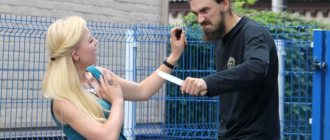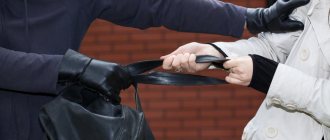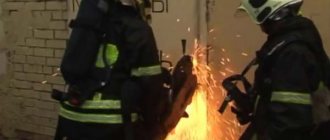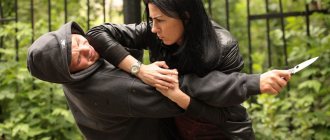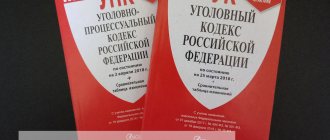Lawyer under Art. 108 of the Criminal Code of the Russian Federation, defense in cases of murder when the limits of necessary defense are exceeded or when the measures necessary to detain the person who committed the crime are exceeded
Exceeding the measures of necessary defense - where and under what circumstances the defense is within the permissible limit, how this limit is established. Each citizen may have his own, different from others, idea of the necessary defense; for some, defending fist against the attacker’s fist is already excessive; others will not be able to defend themselves even with the help of weapons. Extremes happen, but most often law enforcement agencies “go too far” when they are put in the dock under Art. 108 of the Criminal Code of the Russian Federation includes innocent people who protect their loved ones, their home from attacks, threats to life or health, and robbery.
The accusatory bias in the investigation, in the prosecutor's office and in court, the fear of officials to accept responsibility for decisions made based on real circumstances leaves no chance for the defender who caused the death of his attacker to avoid criminal prosecution. For the law enforcement system, if there is a murdered person, then a case will be opened, but it is not customary to stop criminal cases. So think about what is better - to be a living accused or a dead (crippled) victim.
Article 108 of the Criminal Code of the Russian Federation in part one provides for liability for murder committed in excess of the limits of necessary defense up to two years of imprisonment, and in part two for exceeding the measures necessary to detain a person who committed a crime up to three years of imprisonment. Both the first and second parts of Art. 108 of the Criminal Code of the Russian Federation belong to the category of crimes of minor gravity.
Lawyer under Art. 108 of the Criminal Code of the Russian Federation Murder in excess of necessary defense
Lawyer under Art.
108 of the Criminal Code of the Russian Federation can help protect against unfounded charges of exceeding the limits of necessary defense or exceeding the measures necessary to detain a person. In such cases, despite the obligation of the investigation to establish all the circumstances of the act, the defense must prove that the criminal offense was of such a degree and posed such a danger that the measures taken by the client were fully justified. CRIMINAL LAWYER call now: ☎ 8 (495) 532-75-40
Judicial practice under Article 108 of the Criminal Code of the Russian Federation
Resolution of the ECHR dated June 13, 2017
36. In accordance with paragraph 34 of Resolution of the Plenum of the Supreme Court of the Russian Federation dated October 29, 2009 No. 22 1 (hereinafter referred to as Resolution No. 22), the use of detention of a person prior to extradition is allowed only by a court decision adopted on the basis of a petition from the prosecutor in the manner prescribed by Article 108 of the Criminal Code of the Russian Federation (detention).
Resolution of the Presidium of the Supreme Court of the Russian Federation dated June 20, 2018 N 64P18
Chernenko Konstantin Gennadievich, ... convicted: February 20, 1996 under Art. , part 2 art. 144, part 2 art. 144, part 1 art. 149, art. , Criminal Code of the RSFSR to 3 years of suspended imprisonment with a probationary period of 2 years; March 12, 1999 under Part 2 of Art. 108 of the Criminal Code of the RSFSR to 8 years in prison, on the basis of Art. Criminal Code of the RSFSR to 9 years in prison, on July 1, 2005, released on parole for 4 months 16 days, -
Appeal ruling of the Judicial Collegium for Criminal Cases of the Supreme Court of the Russian Federation dated July 10, 2018 N 88-APU18-4
He also believes that his actions need to be reclassified from paragraph “h” of Part 2 of Art. 105 and paragraph “c” of Part 4 of Art. 162 of the Criminal Code of the Russian Federation on Part 1 of Art. 108 and part 2 of Art. 158 of the Criminal Code of the Russian Federation, respectively. In this case, the sentence should be reduced.
Appeal ruling of the Judicial Collegium for Criminal Cases of the Supreme Court of the Russian Federation dated July 20, 2018 N 49-APU18-6
It is noteworthy that the court did not reliably establish the weapon of crime, so from the testimony of witness V. it follows that he (Usmanov I.A.) attacked the victims with a shovel, while the court recognized the metal crowbar with which he was attacked as a crime weapon The victims S. committed the attack, which led to the fact that his actions did not receive a legal assessment under Part 2 of Art. 108 of the Criminal Code of the Russian Federation, moreover, notes that there are no traces of a crime on the scrap metal.
Appeal ruling of the Judicial Collegium for Criminal Cases of the Supreme Court of the Russian Federation dated October 02, 2018 N 20-APU18-8sp
convicted under Part 1 of Art. 108 of the Criminal Code of the Russian Federation to corrective labor for a period of 1 year 6 months with the deduction of 15% of wages to the state income; on the basis of clause 3, part 1, art. 24, part 8 art. 302 of the Code of Criminal Procedure of the Russian Federation was released from the imposed punishment due to the expiration of the statute of limitations for criminal prosecution; according to paragraph “c” of Part 3 of Art. 158 of the Criminal Code of the Russian Federation to imprisonment for a period of 3 years 9 months, serving the sentence in a general regime correctional colony with a fine of 50 thousand rubles and restriction of freedom for 1 year, with the establishment of the restrictions listed in the sentence and the imposition of obligations.
Appeal ruling of the Judicial Collegium for Criminal Cases of the Supreme Court of the Russian Federation dated October 11, 2018 N 11-APU18-18
In the appeal, lawyer Tagirova N.R. in the interests of Isanov N.I. expresses disagreement with the verdict regarding the qualification of the actions of the convicted person and the imposed punishment. Analyzing the evidence in the case, including Isanov’s testimony at the trial and during the preliminary investigation, he believes that Isanov committed the crime in a state of strong emotional disturbance caused by the unlawful behavior of the victims. Refers to Isanov’s grave insult to the victim G., unacceptable for the convicted person due to the long-term serving of his sentence in places of deprivation of liberty, and the use of violence against Isanov by victims who were in a state of alcoholic intoxication - causing him bodily injuries in the head area. Considers the court's conclusion that there was no dangerous attack on Isanov on the part of the victims to be unfounded. Declares that Isanov’s testimony as a suspect is subject to critical assessment, since the latter did not confirm them at the court hearing, indicated that he was in a state of shock, was drunk, the interrogation was carried out at night, he gave testimony from the words of police officers, and in this testimony the order was incorrectly indicated causing bodily harm to victims. He argues for the need to critically evaluate the testimony of victim G., since she was intoxicated that day and is a person interested in the outcome of the case. He asserts that the statements and actions of the victims created a psychologically traumatic environment for Isanov, these actions posed a danger to Isanov’s life and health, and it was the state of strong mental agitation that caused Isanov to exceed the limits of necessary defense. He considers the punishment imposed on Isanov to be unfair due to excessive severity, citing the presence of circumstances mitigating the punishment, positive data about Isanov’s personality, as well as his age and state of health. He asks to change the sentence, to reclassify Isanov’s actions under Part 1 of Art. 108 of the Criminal Code of the Russian Federation, mitigate the punishment, and also reduce the amount of compensation for moral damage recovered in favor of the victim B.
Appeal ruling of the Judicial Collegium for Criminal Cases of the Supreme Court of the Russian Federation dated 09/05/2019 N 11-APU19-13
In the appeal, lawyer Abdrakhmanov A.A. considers the sentence against the convicted Viktorov illegal, due to the discrepancy between the court's conclusions and the actual circumstances of the case. Claims that Viktorov’s guilt in the premeditated murder of victims A. and D. has not been proven. Believes that the court improperly assessed the testimony of witnesses Kh. and K., given by them at the court hearing, that Kh. was not an eyewitness to the murder of A. and D., but , according to K. Viktorov, could not have committed murder. He believes that the testimony of these witnesses coincides with the testimony of Viktorov that he committed the murder of victim A. in self-defense, and D. through negligence, during a struggle. He asks that Viktorov’s actions be qualified under Part 1 of Art. 108 of the Criminal Code of the Russian Federation and Part 1 of Art. 109 of the Criminal Code of the Russian Federation, impose a more lenient punishment.
Appeal ruling of the Judicial Collegium for Criminal Cases of the Supreme Court of the Russian Federation dated December 11, 2018 N 45-APU18-30
Believes that Korepanov’s actions were subject to qualification only under Part 1 of Art. 108 of the Criminal Code of the Russian Federation, as the murder of K. when exceeding the limits of necessary defense. He believes that the court unreasonably did not recognize the behavior of the victim N. as unlawful, pointing out that Tikhanov acknowledged the debt, communicated with the victim, met him at the airport, which is not based on the examined evidence and is an assumption. In fact, the court found that Tikhanov never acknowledged the debt to N. and did not have any contractual relations in writing. According to Tikhanov, he paid money to N. as a result of the latter’s threats, and he himself did not contact law enforcement agencies because N. repeatedly pointed out his corrupt connections with law enforcement agencies.
Appeal ruling of the Judicial Collegium for Criminal Cases of the Supreme Court of the Russian Federation dated January 29, 2020 N 42-APU20-1
convicted under Part 1 of Art. 108 of the Criminal Code of the Russian Federation to 1 year 9 months of restriction of freedom with the establishment of restrictions: not to travel outside the territory of ... district municipality ... not to change the place of residence or stay, place of work without the consent of a specialized state body that supervises the execution by convicts of punishment in the form of restriction of freedom; not leave your home in the period from 23 to 06 o'clock unless absolutely necessary and with the exception of emergency situations, and in other cases without notifying the specialized body and in the presence of good reasons, as well as imposing on him the obligation to appear for registration 2 times a month at the specialized a state body that supervises the serving of sentences by convicts in the form of restriction of freedom.
Appeal ruling of the Judicial Collegium for Criminal Cases of the Supreme Court of the Russian Federation dated January 12, 2017 N 53-APU16-32
ANDREEV S.N., ..., previously convicted: November 11, 2014 under Part 1 of Art. 108 of the Criminal Code of the Russian Federation was sentenced to ten months of restriction of freedom under clauses “d”, “z”, part 2 of Art. 105 of the Criminal Code of the Russian Federation to thirteen years of imprisonment with restriction of freedom for a period of one year; according to paragraph “c” of Part 4 of Art. 162 of the Criminal Code of the Russian Federation to nine years in prison; according to Part 3 of Art. - part 2 art. 167 of the Criminal Code of the Russian Federation to two years in prison.
Appeal ruling of the Judicial Collegium for Criminal Cases of the Supreme Court of the Russian Federation dated May 4, 2017 N 127-APU17-2
- according to Part 3 of Art. , part 1 art. 108 of the Criminal Code of the Russian Federation to 1 year 3 months of imprisonment. In accordance with Part 3 of Art. The Criminal Code of the Russian Federation, for the totality of crimes, by partial addition of punishments, finally imposed 20 years of imprisonment to be served in a high-security correctional colony, with restriction of freedom for 1 year 6 months with the establishment of appropriate restrictions and the imposition of duties specified in the sentence.
What are the specific requirements of the Labor Code of the Russian Federation for special operating modes?
There are operating modes when it is impossible to establish a single lunch break for everyone according to the Labor Code , for example:
- rotating shift schedule;
- irregular schedule;
- continuous nature of work (on a conveyor belt, in continuous cycle production).
In this case, the employer should provide employees with the opportunity to take breaks and eat during the work process. The procedure for providing such lunch breaks should be recorded in the organization’s internal regulations and/or agreements with employees.
Read more about internal regulations in the article “Internal Labor Regulations - Sample 2015”.
Are breaks included in working hours?
leaves (or may leave) the workplace during a lunch break according to the Labor Code of the Russian Federation the lunch break is excluded from the counted working time.
If an employee, going on a lunch break , only briefly breaks away from work without leaving the workplace (under special working conditions), such time intervals are taken into account as part of working time.
You can find more complete information on the topic in ConsultantPlus. Free trial access to the system for 2 days.
Second commentary to Art. 38 of the Criminal Code of the Russian Federation
1. All citizens without exception have the right to detain a person who has committed a crime (hereinafter - AP).
2. There are two groups of conditions that indicate the legality of causing harm in the case of a crime. One of them relates to the characteristics of the crime that the detainee committed and his behavior during detention (first group); the second - to the characteristics of the harm caused during the arrest and the circumstances of the arrest itself (second group).
3. The first group of legality conditions:
1) the detained person has committed a crime, the nature and degree of danger of which can be any. But for this crime the law must provide for punishment in the form of imprisonment (see Article 91 of the Code of Criminal Procedure; this is a necessary condition for the use of detention);
2) the actions of the detained person must indicate his desire to evade responsibility.
4. The second group of legality conditions:
1) the person must be aware that he is detaining the person who committed the crime;
2) the purposes of detention are to bring the person to the authorities and to suppress the possibility of him committing new crimes;
3) detention is carried out by causing harm to the person who committed the crime;
4) it was not possible to detain the person who committed the crime by any means other than causing harm;
5) during detention, the measures necessary for this should not be exceeded.
5. Signs of exceeding the measures necessary for detention are simultaneously:
1) a clear discrepancy between the harm caused to the detainee and the nature and degree of public danger of the crime he committed;
2) a clear discrepancy between the harm caused and the circumstances of the arrest;
3) the intentional nature of the harm caused.
What additional requirements apply to breaks during the working day?
The maximum and minimum time for a lunch break is established according to the Labor Code (Article 108) :
- at least 30 minutes;
- no more than 2 hours.
Other additional requirements for the duration of the lunch break according to the Labor Code have been preserved since the times of the former USSR. The provisions of Soviet documents still regulate such aspects as:
- the lunch break is set in such a way that the working day (shift) is divided approximately in half (resolution of the USSR State Committee for Labor and the Secretariat of the All-Union Central Council of Trade Unions dated May 30, 1985 No. 162/12-55);
- assigning a break no earlier than 4 hours after the start of work with standard working hours, but no regulation of the time interval from the start of work until the lunch break begins, with reduced standards and a flexible schedule (resolution of the USSR State Committee for Labor and the Secretariat of the All-Union Central Council of Trade Unions dated April 29. 1980 No. 111/8-51).
USSR documents regulating lunch breaks are applied to the extent that they do not contradict current legislation.
In certain industries (usually with special requirements for occupational health and safety), there are additional intra-industry provisions establishing the procedure and time for breaks in work.
Punishment for murder committed while exceeding the measures necessary to apprehend the criminal
Murders committed as a result of exceeding permissible measures (Article 108 of the Criminal Code of the Russian Federation), which can be used during the detention of criminals, are criminally punishable if their subjective side has a deliberate expression. A careless form of guilt excludes the criminality of the act and releases the person from liability.
In order to most fully resolve the question of whether the measures required to apprehend criminal elements were actually exceeded, it is necessary to establish and take into account a set of circumstances, including:
- characteristics and level of public danger of the act that was committed (at the time of arrest);
- indicators of danger that were characteristic of the person being detained (propensity to resist, presence of weapons, proficiency in martial arts, etc.);
- the situation prevailing at the time of detention (place and time of action, attempts to escape, intensity of resistance provided).
The main feature of such acts is that they take place only when the original crime is already considered to have been committed. The person carrying out the arrest has the intention of protecting law enforcement interests, which is expressed in the desire to prevent the possibility of committing new crimes and transfer the offender to law enforcement agencies.
Author of the article
Commentary to Art. 38 Criminal Code
1. The conditions for the legality of causing harm when detaining a person who has committed a crime, relating to the grounds for detention (i.e., the crime committed by the person), are: a) only the person who has committed the crime can be detained by causing harm; b) the right to detention arises after the end of the criminal offense in the broad sense of the word and until the expiration of the statute of limitations for criminal prosecution or the expiration of the statute of limitations for a court conviction. Questions regarding the application of Art. 38 of the Criminal Code are devoted to paragraphs 18 - 24 of the Resolution of the Plenum of the Supreme Court of the Russian Federation of September 27, 2012 No. 19.
In this case, it is possible to cause harm when detaining a person who has committed any crime, if other conditions for the legality of causing harm are met, and in particular the condition of proportionality of the harm caused to the nature and degree of public danger of the crime and the situation of detention. In other words, the less dangerous the crime for which a person is detained, the less harm can be caused to him during detention.
2. The conditions for the legality of causing harm during the detention of a person who has committed a crime, relating to the actions of the detainee, are: a) harm during the detention must be caused only to the person who committed the crime; b) when detaining, the situation of detention must be taken into account, i.e., in other words, causing harm must be carried out involuntarily, and be the only method of detention. At the same time, resistance during arrest transforms this circumstance, which excludes the criminality of the act, into a necessary defense; c) the purpose of the arrest must be to deliver the person to the authorities and (or) to suppress the possibility of him committing new crimes; d) when arresting, it is necessary to ensure that the harm caused corresponds to the nature and degree of social danger of the crime committed and the situation of the arrest, i.e. not to exceed the measures necessary to detain the person who committed the crime.
3. Exceeding the measures necessary to detain a person who has committed a crime is recognized as their obvious discrepancy with the nature and degree of public danger of the crime committed by the detainee and the circumstances of the detention, when the person is unnecessarily caused clearly excessive harm not caused by the situation.
The current law establishes criminal liability only for murder, intentional infliction of grievous and moderate harm to health by exceeding the measures necessary to detain the person who committed the crime (Part 2 of Article 108, Part 2 of Article 114 of the Criminal Code). Accordingly, the intentional infliction of minor harm to health, as well as beatings, under no circumstances can be considered as an excess of the measures necessary to detain the person who committed the crime.
4. The issue of the admissibility of causing death to a person during the arrest is ambiguously resolved. On the one hand, it is indicated that allowing death to be caused during detention would be contrary to the meaning of this norm and the purposes of detention specified in the law (delivery of a person to the authorities).
On the other hand, it is permissible to take the life of a detainee in exceptional circumstances, when the crime committed is extremely socially dangerous and there is a risk that, having escaped, the person will continue criminal activity of a similar nature and degree of social danger.
5. It is necessary to distinguish between causing harm when detaining a person who has committed a crime from necessary defense. Causing harm during an attack for the purpose of protection forms a state of necessary defense. On the contrary, causing harm after the end of the assault in order to detain a person and suppress the possibility of him committing new crimes already constitutes causing harm when detaining the person who committed the crime. Accordingly, causing harm after the end of the assault, but not for the legitimate purposes specified in the commented article, but, for example, for the purpose of reprisal, constitutes an intentional crime, classified on a general basis.
Is it possible to move the lunch break to the evening?
Employees often turn to their employer with a request to move their lunch break to the last hour of work. This way they hope to get a shorter working day during the break.
However, the opinion of lawyers and the labor inspectorate on this issue is clear: according to the Labor Code of the Russian Federation, it is impossible to postpone the lunch break during dinner. This will violate the requirement of Art. 108 of the Labor Code of the Russian Federation, according to which lunch time, according to the Labor Code , is provided during the working day, and not after it .
Why do you need a lawyer under Article 108?
If you have been charged under Article 108 of the Criminal Code of the Russian Federation, immediately find your criminal lawyer. Otherwise, investigators may classify murder in excess of self-defense as “ordinary murder”: instead of the maximum 3 years in prison, you will face a sentence of 6 to 15 years. A criminal lawyer will guide you past the pitfalls and block the possibility of changing the article to a more serious one.
To prevent Article 108 of the Criminal Code of the Russian Federation from being changed to Article 105 “Murder”, you will need the help of an experienced criminal lawyer. For the sake of my clients I:
- I seek a mitigation of punishment or the abolition of a preventive measure;
- I organize a forensic examination not from a departmental expert, but from an independent expert;
- representing your interests in court;
- I make every effort to exclude from your case evidence collected by the investigator in violation of the criminal procedure code;
- I am present at all investigative events - confrontations, searches, interrogations - and make sure that your rights are not violated;
- I collect evidence in your interests;
- I find defense witnesses and convince them to come to court and support you.
Consultation is the most important stage of protection. You can ask me all the questions you are interested in and receive detailed answers regarding your situation.
For each of my clients, I develop an individual strategy aimed at achieving a positive result. For my part, I promise to do everything possible to help you cope with the difficulties that arise. All you need to do is call and clearly state your problem.
